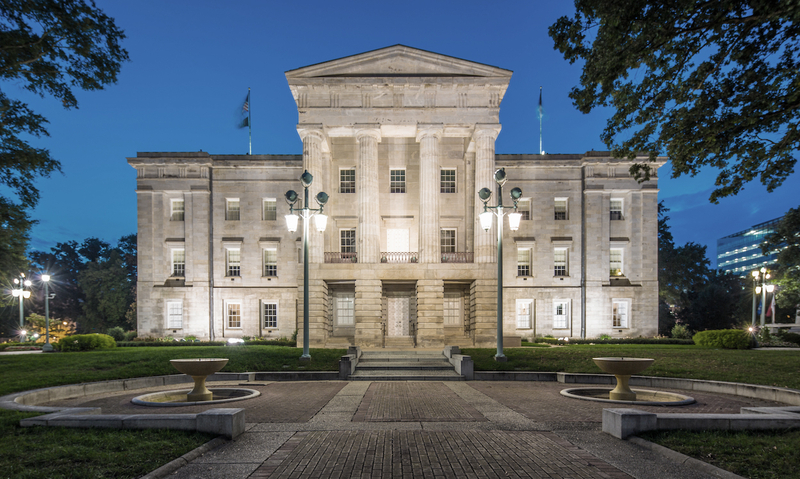Charter school advocates’ obsession with small federal grant program continues to distract from efforts to provide charter students the funding they’re owed

Look at the chart below. Which is larger, the column on the left or the column on the right?

If you answered, “the column on the right” – potential funding increase for charter schools under Leandro – you would be correct. The $405 million of new funding that charters stand to gain from the long-running Leandro court case is more than 61 times the $6.6 million that North Carolina charter schools currently receive through federal Charter School Program (CSP) grants on an annualized basis.
You wouldn’t know this by listening to North Carolina’s leading charter school advocates who have been railing about proposed changes to CSP rules while keeping weirdly silent on the benefits Leandro. This misguided focus continues to undermine efforts to get charter school students the vital school supports they are owed under our state constitution.
As a reminder, Leandro is a 28-year-long court case establishing that North Carolina schools – including charters – are dramatically underfunded. Our state constitution guarantees all students the right to a “sound basic education,” yet lawmakers continue to fail to meet this basic standard. The courts have ordered North Carolina lawmakers to implement a detailed, research-based plan that would provide charter schools an approximately 45 percent increase in state funding by the 2028 school year.
The federal CSP grant provides supplemental funding for North Carolina charters ostensibly “focused on meeting the needs of educationally disadvantaged students.” North Carolina has awarded 61 of the state’s 203 charter schools five-year grants totaling $33 million. Funding for this program remains unchanged under the Biden Administration. However, the Biden Administration recently unveiled potential rule changes that have driven the charter community into a collective conniption. Their anger belies the modest nature of the proposed rule changes, which are largely centered on prioritizing grants for schools that innovate, collaborate with their community, and avoid contributing to racial segregation.
For some reason though, the North Carolina charter community continues to focus on the proposed CSP changes, while staying silent on the much larger issue of whether or not legislators will fulfill their constitutional duty to provide students with access to “sound basic” schools.
For example…
Lindalyn Kakadelis, Executive Director of the North Carolina Coalition for Charter Schools penned an op-ed that grossly mischaracterizes the CSP rule changes as something that will “restrict access” and says the changes will prevent charter schools from “continu(ing) doing their jobs.”
Rhonda Dillingham of the NC Association for Public Charter Schools claims that the CSP rule changes, “put the brakes on progress towards quality educational options for everyone and damage our public school system.”
The John Locke Foundation’s Terry Stoops says that proposed CSP rule changes sacrifice “essential freedoms” and that these “politically motivated regulations will harm…millions of children.”
Again, the Biden Administration isn’t threating to close any charter schools or even cap their growth. The administration simply suggests prioritizing funding for charters that actually live up to the original promises of charter schools. That is, funding would be prioritized for charters that collaborate with traditional school partners to share innovative practices without harming nearby schools financially or exacerbating racial segregation.
These same charter leaders are strangely silent when it comes to Leandro. In the case of Stoops, he actively advocates against it.
Of course, charter school students face many of the same unconstitutional barriers impeding students in traditional public schools. Due to persistent underfunding, many charters have difficulty attracting and retaining great teachers and principals. They are unable to offer basic services like child nutrition and mental health supports. And many charters are housed in dilapidated or subpar facilities.
In recent years, charter schools have struggled to provide their students the same academic growth as their peers in traditional public schools.
The 45 percent increase in funding offered by the Leandro plan will help reverse these negative trends in North Carolina’s charter schools. Just as in traditional public schools, Leandro funding will allow charter schools to expand course offerings, enrichment programs, and extracurricular activities. New investments in technology and other materials will help schools individualize instruction, while additional personnel will lower class sizes and provide students with much-needed mental health services.
So why are these charter leaders silent on Leandro? I could certainly speculate, but I’m hoping this piece will elicit a response. It is hard to imagine any possible reason that actually centers the best interests of charter school students.
In the meantime, I urge charter school leaders, educators, families, and students to reconsider the larger agenda of the North Carolina charter school movement. The North Carolina Constitution is clear that all students, including those in charter schools, deserve access to schools led by great educators that are equipped with the resources necessary to help their students flourish. It’s the Leandro Plan, not the CSP, that will deliver charter students the type of school they are owed.








